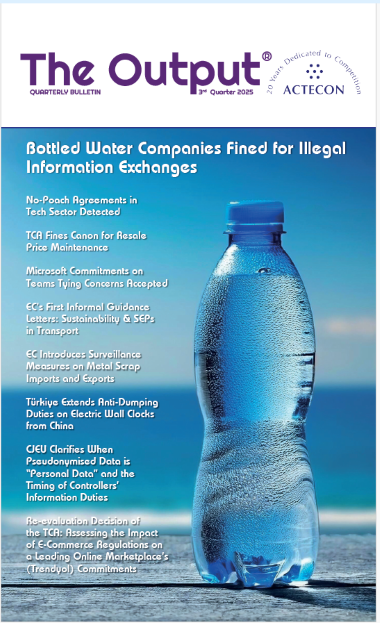The Commitment Mechanism is not Open to Negative Matching Agreements
| Competition Law

The Commitment Mechanism is not Open to Negative Matching Agreements
Article by Mustafa Ayna, Özlem Başıböyük Coşkun and Cansen Erensoy
INTRODUCTION
The Turkish Competition Authority (“TCA”) launched a full-fledged investigation (“Investigation”) against Arabam Com İnternet ve Bilgi Hizmetleri A.Ş. (“Arabam.com”), Vava Cars Turkey Otomotiv A.Ş. (“VAVA CARS”), Araba Sepeti Otomotiv Bilişim Danışmanlık Hizmetleri Sanayi ve Ticaret A.Ş. (“KAVAK”), and Letgo Mobil İnternet Servisleri ve Ticaret A.Ş. (“Letgo”), which operate in the purchase and sales of second-hand passenger cars via their online platforms to determine whether these undertakings violated Article 4 of Law No. 4054 on the Protection of Competition (“Competition Law”). Further to the initiation of the investigation, VAVA CARS and Arabam.com submitted their requests to initiate commitment negotiations but TCA rejected their requests. Then, both undertakings requested a re-evaluation of their commitment requests as per Article 11 of the Administrative Procedure Law No. 2577 (“Administrative Procedure Law”) prior to challenging the relevant decisions before the administrative judiciary.
In this regard, the TCA recently published two reasoned decisions that evaluate the applications of Arabam.com[1] and VAVA CARS[2] under Administrative Procedure Law requesting a re-evaluation of their requests to offer commitments. Subsequent to the publication of these reasoned decisions, it is seen that the behaviours of the relevant undertakings subject to the Investigation are related to the "negative matching obligation," which is a prominent topic within the scope of Turkish competition law practice via the TCA’s Modanisa Decision[3].
- The TCA Did Not Recognize the Defence on Trademark Rights
The evidence in the case file includes certain correspondences of Arabam.com and VAVA CARS with their competitors in which they notified each other regarding their online advertising activities. In this context, Arabam.com and VAVA CARS attempted to trigger the commitment mechanism set forth under Article 43(3) of Competition Law and Communiqué No. 2021/2 on Commitments for Preliminary Investigations and Investigations on Anticompetitive Agreements, Concerted Practices, Decisions and Abuse of Dominant Position ("Communiqué No. 2021/2").
Within the scope of the letters submitted to the TCA regarding the requests to offer commitments of both Arabam.com and VAVA CARS, the relevant undertakings argued that the view that the investigated practices did not constitute a violation of Competition Law. In terms of the negative matching obligation, it is mainly alleged that the relevant practices were aimed at the use of the trademark right and the prevention of infringement of the trademark right by competitors under Intellectual Property Law No. 6769 (“IP Law”). In fact, the relevant undertakings believed were the only method they had on Google Ads within the scope of protection of trademark rights. In line with the foregoing, they argued that the relevant negative matching practices did not restrict competition either by object or by effect.
Pursuant to Article 6(1) of the Commitment Communiqué, the Board determines either to initiate discussions or reject the commitment request based on its evaluation of the nature of the infringement under investigation, along with other issues found appropriate. As for the case at hand, the TCA rejected both undertakings’ requests to initiate the commitment negotiations for the reasons explained below.
- The Investigated Practices are Considered Naked and Hard-Core Infringement
Subsequent to receiving the rejection decisions to the relevant undertakings, both Arabam.com and VAVA CARS challenged the relevant decisions and requested that the TCA initiate commitment negotiations in accordance with Article 11 of the Administrative Procedure Law.
It also should be noted that in addition to the defences included in its commitment request, at this stage, Arabam.com also provided its opinion on the nature of negative matching obligation within the context of both the commitment mechanism and the TCA and foreign authorities’ current approaches as follows:
- The investigated practices did not constitute a naked and hard-core infringement, which are listed numerus clausus within the scope of Communiqué No. 2021/2. However, the TCA discretionarily expanded the scope of naked and hard-core restrictions in its evaluation of commitment request.
- In its Modanisa Decision, the TCA evaluated whether the agreement that contained a negative matching obligation could benefit from the individual exemption and concluded that the agreement did not constitute naked and hard-core infringement, but only led to potential anticompetitive effects.
- The EU competition law legislation and precedents do not regulate negative matching agreements as naked and hard-core infringements, while the U.S. Federal Trade Commission acknowledged that the agreements on negative matching obligation do not constitute per se restriction.
Further to the relevant undertakings' re-evaluation request, the TCA provided its evaluation that negative matching agreements restrict the ability of consumers to compare prices between competitors and artificially direct them to certain undertakings. At this point, to refute the interpretation of Arabam.com and to demonstrate its consistent approach, the TCA referred to its evaluation within the Modanisa Decision that “negative matching agreements have similar effects to customer/market sharing agreements between competitors in the relevant markets.” The TCA defined the competitive problem arising from such agreements as the reduction of the possibility of competing undertakings appearing in the text advertisements at the top of the search engine results page and the possibility of digital comparison, along with the fact that the consumer may be provided with fewer options.
At this point, it is crucial to refer to the TCA’s evaluations on negative matching practices provided in its Modanisa Decision in which the TCA assessed the agreement setting forth negative matching obligation between Modanisa Elektronik Mağazacılık ve Ticaret A.Ş (“Modanisa”) and EST Marjinal Medikal Tanıtım ve İletişim San. ve Tic. Ltd. Şti. (“Sefamerve”) in consideration of the trademark protection concerns arising from IP Law. In this context, the TCA concluded the followings within the scope of its negative clearance assessment:
- the non-targeting obligation imposed only on registered trademarks is in the nature of narrow non-brand bidding agreements and falls within the scope of the trademark protection granted by IP Law to right holders,
- the non-targeting obligation imposed on phrases that are not registered as trademarks (such as phrases derived from the partial spelling of trademarks) exceeds the limits of trademark protection in any case, and
- the negative matching obligation has the potential to cause similar effects to customer/market sharing since it exceeds the limits of the trademark protection provided by IP Law as it results in the competitors blocking the impression of each other's ads even when they do not specifically bid on each other's brands.
Accordingly, the TCA assessed whether the agreement meets the conditions to be granted an individual exemption set forth in Article 5 of Competition Law and concluded that the agreement in its notified form cannot benefit from an individual exemption on the following grounds:
- the implementation of the agreement would not eliminate competition in a significant part of the relevant market and its impact on competition in the relevant markets may be limited considering that the agreement is limited only between Sefamerve and Modanisa, whose market shares are considerably lower compared to the rest of the market,
- negative matching agreements are unlikely to prevent the problem of free-riding, and likely to have market/customer sharing-like effects and limit consumers' choices since they limit the ads that could be displayed for queries with a very broad set of keywords and prevent consumers from being notified of competitors of the relevant brand, and
- implementing wide negative matching obligations could not be considered necessary and proportional compared to less restrictive alternatives, such as narrow non-brand bidding agreements.
CONCLUSION
These decisions have prominent nature in terms of Turkish competition law practices. Indeed, although the relevant decisions do not include a comprehensive evaluation of online advertising practices, they strengthen the TCA’s approach to negative matching agreements whose foundations were laid with the Modanisa Decision in 2021. It is observed that the TCA does not pay regard to the arguments that narrowly explain negative matching agreements only in terms of IP Law. On the contrary, the TCA reiterates its evaluation that negative matching agreements have similar impacts on relevant markets such as customer/market sharing agreements, which are considered naked and hard-core restrictions.
Similarly, although the commitment mechanism was introduced in 2020 (with details regulated through a communiqué in 2021), these two reasoned decisions enrich the TCA precedents on applications made within the scope of Article 11 of Administrative Procedure Law with regard to the TCA’s rejection of commitment requests.






